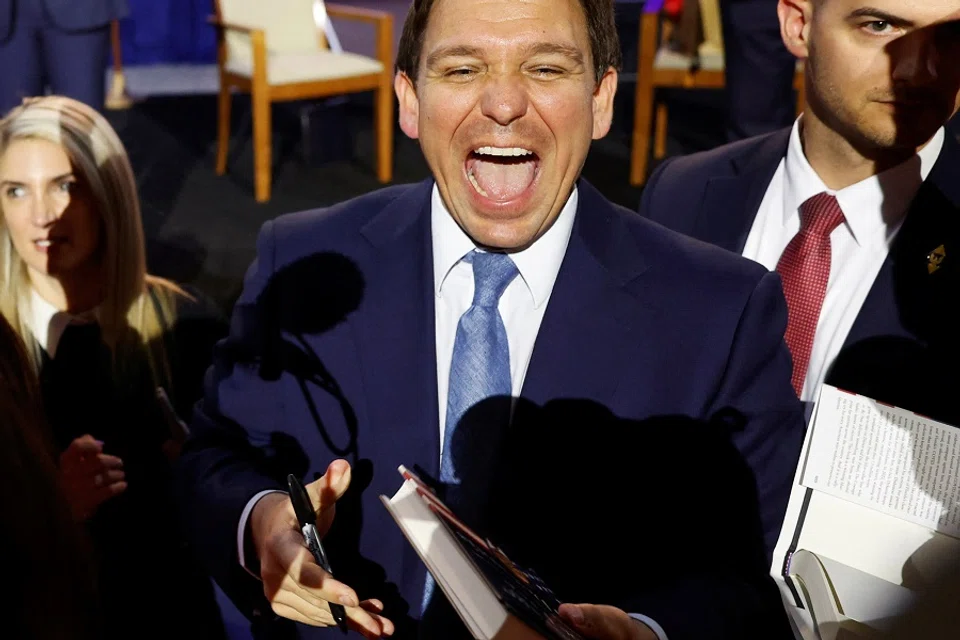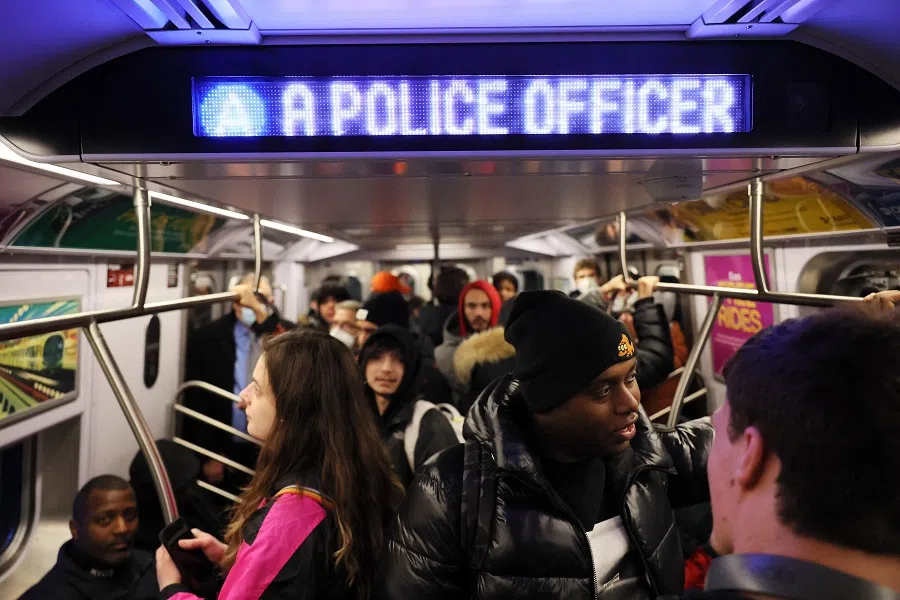The US is seeing a right-wing resurgence
Political rising star and possible candidate for future US president Ron DeSantis has set off a public debate on racism and its place in the American education system. But beneath the public backlash lies the perennial tussle between the conservative right and progressive left. While the US's polarised state is a given, is the US society shifting further towards the right?

In the current US political landscape, Florida governor Ron DeSantis is seen as a rising star and a strong contender for US presidency. In a recent opinion poll, the post-70s politician not only has a huge lead over former US President Donald Trump but is also slightly ahead of incumbent President Joe Biden.
A younger Trump
Republican DeSantis was born in Florida in 1978 to Italian immigrant parents of lower-middle class. In fact, DeSantis' grandfather was an early 20th century Italian immigrant who lived in Pittsburgh, not far away from where I live. This area continues to be an Italian enclave today, and has long been a conservative area on the US's political map.
DeSantis climbed the social ladder through his undergraduate studies at Yale University, training at Harvard Law School, and experience in the US military. If he does become the next US president, it would imply that the American presidency has again shifted from being overwhelmingly dominated by traditional English immigrants to non-English or non-whites after having achieved some degree of ethnic diversity - Barack Obama is of African ancestry, while Trump is of German ancestry. This is beneficial for pluralist politics in the ethnic sense.

However, having a diverse ethnic background does not necessarily mean that one's political philosophy will be more open and inclusive. At present, DeSantis is just like a younger Trump. During his tenure as Florida governor, DeSantis rejected various reasonable and effective Covid-19 measures such as the stay-at-home order and mask and vaccine mandates. In May 2021, he even signed a bill into law that prohibits government entities, businesses, schools and cruise ships across Florida from requiring people to provide proof of Covid-19 vaccination.
The most controversial bill that DeSantis passed to date is the banning of critical race theory (CRT) in American history classes. Simply put, CRT rests on the premise that racism is ubiquitous in the political and social spheres of the US, and that all whites are potential racists, whether they admit it or not. Students who learn about the theory are thus expected to find racist practices and critique them.
... the most recent CRT was the third step in penetrating the human consciousness, requiring one to examine one's own thoughts and correct historical knowledge beyond the legal and social levels.
I believe that there is indeed a deep-seated notion of white supremacy in American culture, and that CRT is useful for correcting this notion in the white community and for reflecting on implicit racial biases. In fact, in the century-long history of racial entanglements in the US, it can be said that Abraham Lincoln's abolishment of slavery was the first step in tackling racial discrimination through war and legislation.

The civil rights movement was the second step in promoting racial coexistence through legislation at the social level. And the most recent CRT was the third step in penetrating the human consciousness, requiring one to examine one's own thoughts and correct historical knowledge beyond the legal and social levels.
CRT is related to "woke culture" and the "woke" movement, which is seen as an awakening of black consciousness, a questioning of the dominant paradigm and the fight for a better society. DeSantis' policy inclination shows that he upholds the orthodox historical narrative and does not want the masses to be overly introspective.
Ideological reflection
Indeed, the application of CRT in recent years has not been smooth sailing, despite little opposition to the civil rights movement and its outcome in the US today, and the fact that Martin Luther King Jr. is revered as a contemporary American political and cultural icon.
Some Americans think that an overly aggressive need for ideological reflection and a forced reshaping of historical memory seems to be no different from the idea of "totalitarianism" that Americans most detest. Others are worried that an all-round critique, examination and retelling of American history through the lens of "racism" would subvert the legitimacy of American history and the essence of its pursuit of freedom and equality.
Clearly, the way in which the US's relatively short but complex and exciting history is told in schools and colleges has become a battleground in the left-right tussle, in what the Americans call "history wars".
After banning the teaching of CRT in elementary and middle schools and removing teaching materials and programmes influenced by CRT, DeSantis now plans to pass House Bill 999, filed in the Florida House of Representatives on 21 February. The bill would apply the same orthodox and conservative stance in higher education, allowing university boards to review the educational content of higher education institutions in Florida and prohibit them from using CRT to "suppress or distort significant historical events" through core courses in general education for undergraduates.

Clearly, the way in which the US's relatively short but complex and exciting history is told in schools and colleges has become a battleground in the left-right tussle, in what the Americans call "history wars".
In response, the American Historical Association (AHA) issued a statement on 3 March opposing Florida House Bill 999, expressing the firm stance of most left-leaning progressive historians for defending pedagogical autonomy. They believe that teachers have the right to decide what to teach and what content to "suppress", and that boards of trustees do not have the right to determine if what is taught about American history is "contrary to the creation of a new nation based on the universal principles stated in the Declaration of Independence". Furthermore, they assert that it is not up to the board of trustees to decide whether the Declaration of Independence or the US Constitution better represents the political framework for the founding of the US.
The AHA maintains that racism "is a central aspect of American historical development". But they also stressed that what matters most is not so much the content taught as it is helping students change their way of thinking, and criticised the bill for trying to "incite and divide". In fact, from the perspective of historians who value freedom of thought, such intervention is "totalitarian" in itself.
... the society could very likely shift further to the conservative right and deny some of the ideological and social progress driven by the progressives in the future.
Moving towards conservatism
I think that these controversies underlie the tussle between the orthodox right and progressive left in contemporary America. But given DeSantis' advantage of being born in the 1970s, his excellent resume and his bullish political popularity, his right-leaning conservative political position will still attract considerable attention, whether he is eventually elected as president or not.
Given that the US's polarised state is deep-seated, the society could very likely shift further to the conservative right and deny some of the ideological and social progress driven by the progressives in the future.

However, the progressive left needs to reflect on itself too. As mentioned above, the unquestionable and excessively critical demand for individual introspection on racial issues could easily lead to resistance and resentment. While a white American can accept affirmative and inclusive policies at the legal level, it is difficult to achieve a complete cleansing of the soul through constant self-criticism at the personal and spiritual levels at the same time.
On a cognitive level, while it is true that any society had, and still has a dark side, and that all progress is the result of the constant struggle of the underprivileged, teaching American history in an overly negative manner because of such ideas is not entirely convincing as well.
DeSantis' grandparents had immigrated to the US with little money and his father had worked hard to make a living as an ordinary worker, yet he is already getting ready to run for president before even turning 50. He may therefore believe that he has already achieved the American Dream of upward mobility, and it would be difficult for his perception to leapfrog to the level of criticism as the university intellectual elite.

Asian Americans have also shifted further to the right because of the progressive left's lofty ideals and impracticality. Many Asians think that left-wing progressive policies do not encourage academic excellence but rather condone crime.
In a recent New York Times article, a New York City resident born in the 1970s who has always voted for the Democrats voted for the Republican Party for the first time last year. This is because the extended Covid-19 school closures that the progressive left supported benefited highly educated white-collar parents but caused great distress to blue-collar parents who must leave home to make ends meet.
One of my post-70s Chinese American friends once shared with me that a high school library in the US had displayed graphic and explicit books promoting homosexuality, which triggered a backlash among parents. In any case, the left-right tussle in American society appears set to turn in favour of a right-wing resurgence in the future.
Related: Price of the American dream: Do immigrants have to forget their past? | Can America find its way under Biden? | Chinese liberal intellectuals divided over Trump and the US elections | Biden presidency a turning point for China-US relations? | Biden has good strategies, but can he implement them?





